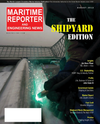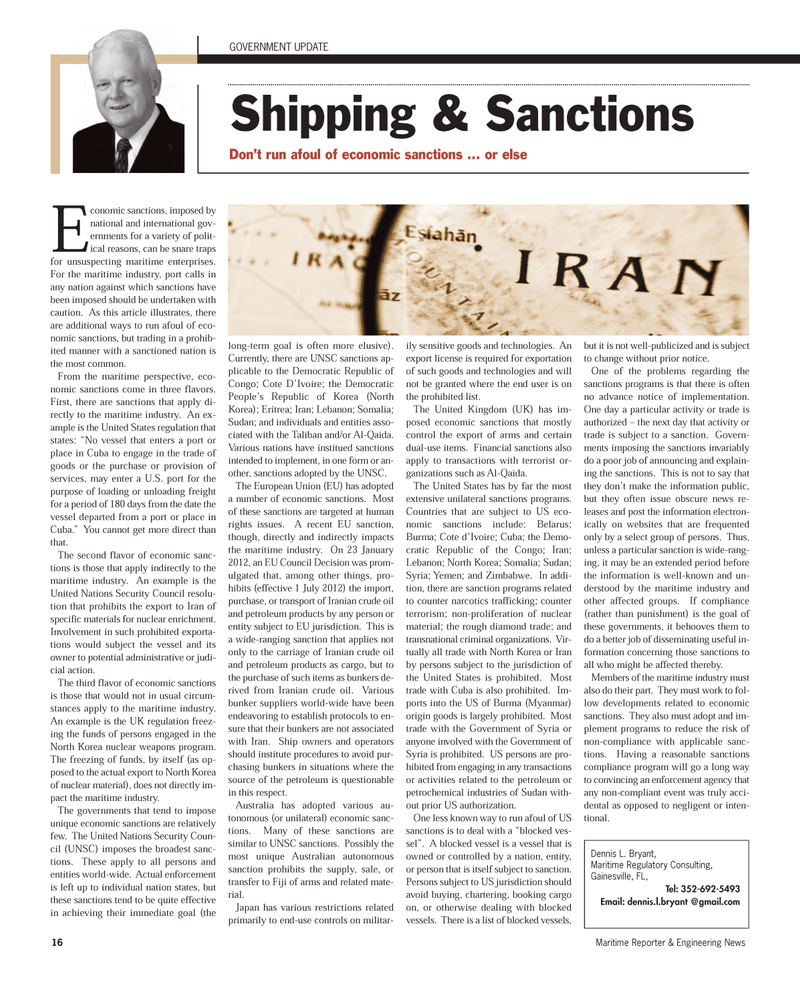
Page 16: of Maritime Reporter Magazine (August 2012)
The Shipyard Edition
Read this page in Pdf, Flash or Html5 edition of August 2012 Maritime Reporter Magazine
16Maritime Reporter & Engineering News Economic sanctions, imposed bynational and international gov- ernments for a variety of polit- ical reasons, can be snare trapsfor unsuspecting maritime enterprises.For the maritime industry, port calls in any nation against which sanctions have been imposed should be undertaken with caution. As this article illustrates, there are additional ways to run afoul of eco- nomic sanctions, but trading in a prohib- ited manner with a sanctioned nation isthe most common. From the maritime perspective, eco- nomic sanctions come in three flavors. First, there are sanctions that apply di-rectly to the maritime industry. An ex- ample is the United States regulation that states: ?No vessel that enters a port or place in Cuba to engage in the trade of goods or the purchase or provision of services, may enter a U.S. port for thepurpose of loading or unloading freightfor a period of 180 days from the date thevessel departed from a port or place in Cuba.? You cannot get more direct than that.The second flavor of economic sanc- tions is those that apply indirectly to themaritime industry. An example is the United Nations Security Council resolu-tion that prohibits the export to Iran of specific materials for nuclear enrichment. Involvement in such prohibited exporta- tions would subject the vessel and its owner to potential administrative or judi- cial action. The third flavor of economic sanctions is those that would not in usual circum- stances apply to the maritime industry. An example is the UK regulation freez- ing the funds of persons engaged in the North Korea nuclear weapons program. The freezing of funds, by itself (as op-posed to the actual export to North Korea of nuclear material), does not directly im-pact the maritime industry. The governments that tend to impose unique economic sanctions are relatively few. The United Nations Security Coun- cil (UNSC) imposes the broadest sanc-tions. These apply to all persons and entities world-wide. Actual enforcement is left up to individual nation states, but these sanctions tend to be quite effective in achieving their immediate goal (the long-term goal is often more elusive). Currently, there are UNSC sanctions ap- plicable to the Democratic Republic ofCongo; Cote D?Ivoire; the Democratic People?s Republic of Korea (North Korea); Eritrea; Iran; Lebanon; Somalia; Sudan; and individuals and entities asso- ciated with the Taliban and/or Al-Qaida. Various nations have institued sanctions intended to implement, in one form or an-other, sanctions adopted by the UNSC. The European Union (EU) has adopteda number of economic sanctions. Mostof these sanctions are targeted at human rights issues. A recent EU sanction, though, directly and indirectly impactsthe maritime industry. On 23 January 2012, an EU Council Decision was prom- ulgated that, among other things, pro- hibits (effective 1 July 2012) the import, purchase, or transport of Iranian crude oiland petroleum products by any person or entity subject to EU jurisdiction. This is a wide-ranging sanction that applies notonly to the carriage of Iranian crude oiland petroleum products as cargo, but to the purchase of such items as bunkers de- rived from Iranian crude oil. Various bunker suppliers world-wide have been endeavoring to establish protocols to en- sure that their bunkers are not associated with Iran. Ship owners and operators should institute procedures to avoid pur- chasing bunkers in situations where the source of the petroleum is questionablein this respect.Australia has adopted various au- tonomous (or unilateral) economic sanc-tions. Many of these sanctions are similar to UNSC sanctions. Possibly themost unique Australian autonomous sanction prohibits the supply, sale, or transfer to Fiji of arms and related mate-rial. Japan has various restrictions related primarily to end-use controls on militar- ily sensitive goods and technologies. An export license is required for exportation of such goods and technologies and willnot be granted where the end user is onthe prohibited list.The United Kingdom (UK) has im-posed economic sanctions that mostlycontrol the export of arms and certain dual-use items. Financial sanctions alsoapply to transactions with terrorist or- ganizations such as Al-Qaida. The United States has by far the most extensive unilateral sanctions programs. Countries that are subject to US eco-nomic sanctions include: Belarus;Burma; Cote d?Ivoire; Cuba; the Demo- cratic Republic of the Congo; Iran;Lebanon; North Korea; Somalia; Sudan; Syria; Yemen; and Zimbabwe. In addi- tion, there are sanction programs relatedto counter narcotics trafficking; counter terrorism; non-proliferation of nuclearmaterial; the rough diamond trade; andtransnational criminal organizations. Vir- tually all trade with North Korea or Iran by persons subject to the jurisdiction ofthe United States is prohibited. Mosttrade with Cuba is also prohibited. Im-ports into the US of Burma (Myanmar)origin goods is largely prohibited. Most trade with the Government of Syria or anyone involved with the Government of Syria is prohibited. US persons are pro-hibited from engaging in any transactions or activities related to the petroleum or petrochemical industries of Sudan with-out prior US authorization. One less known way to run afoul of US sanctions is to deal with a ?blocked ves- sel?. A blocked vessel is a vessel that is owned or controlled by a nation, entity, or person that is itself subject to sanction.Persons subject to US jurisdiction shouldavoid buying, chartering, booking cargo on, or otherwise dealing with blocked vessels. There is a list of blocked vessels, but it is not well-publicized and is subject to change without prior notice.One of the problems regarding the sanctions programs is that there is oftenno advance notice of implementation. One day a particular activity or trade is authorized ? the next day that activity or trade is subject to a sanction. Govern- ments imposing the sanctions invariably do a poor job of announcing and explain- ing the sanctions. This is not to say that they don?t make the information public, but they often issue obscure news re- leases and post the information electron-ically on websites that are frequentedonly by a select group of persons. Thus, unless a particular sanction is wide-rang-ing, it may be an extended period before the information is well-known and un- derstood by the maritime industry andother affected groups. If compliance (rather than punishment) is the goal ofthese governments, it behooves them to do a better job of disseminating useful in-formation concerning those sanctions toall who might be affected thereby. Members of the maritime industry mustalso do their part. They must work to fol- low developments related to economic sanctions. They also must adopt and im- plement programs to reduce the risk ofnon-compliance with applicable sanc-tions. Having a reasonable sanctions compliance program will go a long way to convincing an enforcement agency that any non-compliant event was truly acci- dental as opposed to negligent or inten- tional. GOVERNMENT UPDATE Shipping & SanctionsDon?t run afoul of economic sanctions ... or else Dennis L. Bryant, Maritime Regulatory Consulting,Gainesville, FL, Tel: 352-692-5493 Email: dennis.l.bryant @gmail.com MR#8 (10-17):MR Template 8/9/2012 3:11 PM Page 16

 15
15

 17
17
